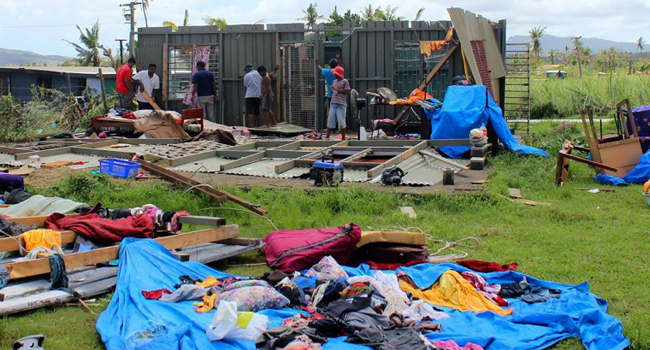FIJI, Feb 23 – The death toll from Fiji’s super-cyclone hit 29 on Tuesday, with officials saying the Pacific nation’s recovery from the devastating storm could take months.
As aid efforts intensified, communications were established with some of the worst-hit remote communities, revealing the scale of the disaster.
“The official death toll now is 29, another eight bodies were found on the island of Koro since yesterday,” government spokesman Ewan Perrin told Radio New Zealand in a phone interview.
“We are expecting it to rise but we’re hoping it’s going to rise by a very small number.”
Severe tropical cyclone Winston, the most powerful storm ever recorded in the southern hemisphere, lashed the island nation overnight Saturday, packing wind gusts of 325 kilometres (202 miles) per hour and leaving a trail of destruction.
About 8,500 people are still sheltering in evacuation centres and Perrin said some villages had hardly any buildings still standing.
“We’re still trying to get people on the ground in these areas to do a detailed assessment of the damage. We’re just taking it day-by day,” he said.
“In some places people are going to be displaced for months because they’ve lost everything.”
The rising toll makes Winston the deadliest cyclone to ever hit Fiji, according to the Fiji Broadcasting Corporation, which said the previous worst was cyclone Eric in 1993.
“We haven’t been able to make contact with all parts of Fiji, although with the assistance of the New Zealand Air Force we’ve managed to do aerial inspections across almost all of the islands,” Perrin added.
“There’s considerable damage of course across the top of the main island (Viti Levu) and the island of Koro, which took pretty much a direct hit.”
-‘Truly heartbreaking’-
The New Zealand Air Force photographs show entire villages flattened by the first category five storm to hit Fiji.
Many homes were reduced to piles of kindling, with roofing and furniture strewn about by winds that were strong enough to strip leaves and branches from trees.
In one image a lone man stands on the tin roof of his ruined home, apparently waving both arms at the military plane as it passes overhead.
“The images emerging from early aerial assessments of affected areas are truly heartbreaking, leaving little doubt about the ferocity of this cyclone,” said the UN’s Fiji coordinator Osnat Lubrani.
“It is clear from these catastrophic impacts that Fiji is facing a long road to recovery.”
Power is gradually being restored in the main centres and roads cleared of felled trees.
© AFP
A photo taken on February 21, 2016 shows the damage to the settlement of Tavua on the main Fiji island of Viti Levu after the most powerful cyclone in Fiji’s history battered the Pacific island nation
© New Zealand Defence Force / HO/AFP/File
The international airport at Nadi also reopened on Monday, allowing international tourists caught up in the disaster to return home.
Aid efforts have ramped up, with Australia contributing a Aus$5.0 million (US$3.6 million) package including basics such as food and drinking water.
Canberra had also offered the use of a P-3 Orion aircraft and MRH-90 helicopters to reach outlying islands.
New Zealand has contributed NZ$2.2 million (US$1.5 million) and sent a C-130 Hercules carrying relief supplies.
The nation has declared a month-long state of natural disaster after a storm that Prime Minister Voreqe Bainimarama described as an “assault on Fiji”.
Bainimarama, who has mobilised police and the military to help relief efforts, said he was determined to get Fiji back on its feet.
“There are Fijians out there who are without water, without a roof over their heads, without food and without essential services,” he said.
“It is our duty to determine their needs and provide them with the support they need as soon as possible.”










































